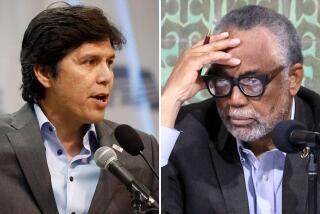Manager Advises Redondo Council: Be Nice : Politics: Aware that their squabbles looked bad on television, council members asked the new city executive for tips on how to cool it. He obliged.
When politicians bicker, that’s democracy. But when they decide to be nicer to each other, well, that’s news.
So, a bulletin: After years of smart cracks and barbed asides, the Redondo Beach City Council has agreed to get polite.
Unanimously, behind the scenes, and with no small amount of off-the-record finger pointing, the mayor and five-member council decided during the past week to shorten their meetings, curb their rhetoric and stop snorting in derision at each other during their twice-monthly Tuesday night public sessions.
The catalyst, council members said, was a confidential memo to the mayor and the council distributed last week by the newly hired city manager. After a typically testy council session late last month, several council members asked his advice on how they could be more businesslike in public.
“I generally keep my thoughts about how my bosses conduct their business (that is why I have survived in this business for 20 years),” Manager Bill Kirchhoff wrote, “but in the ‘since you asked’ category, . . . I have never seen a City Council conduct a business meeting like you do.
“Ours is more akin to rough-and-tumble union hall labor negotiation than the business meeting for an upper-economic, historical city steeped in rich traditions,” Kirchhoff wrote. “. . . Your energy and enthusiasm for the job is limitless, but you sure come off looking bad.”
Meetings weren’t always raucous and lengthy, but that has become the rule in recent years.
Fueling the problem, in part, are longstanding personality clashes and political differences that are fertile soil for cheap shots and sharp remarks. Tempers have been lost and voices raised over everything from the date for discussing the city budget to whether the local high school trustees manage their money properly. Frequently, the exchanges climax with someone’s motives being impugned, and wind down amid a flurry of outraged denial. And all of it is televised live on the local-access cable channel.
Last March, for example, a public set-to between Councilwomen Barbara Doerr and Kay Horrell set off a cacophony on the dais that died down only after the mayor screamed, several times, “Knock it off!”
Meanwhile, Doerr had managed to accuse everyone else on the council of selling out to developers, Horrell had offhandedly branded Doerr a liar and viewers had been treated to the spectacle of Councilman Terry Ward and then-Councilman Ron Cawdrey huffing and rolling their eyes in frustration and outrage.
Nor is there a paucity of issues for the council to fight about. No street light is too far-flung, no charity fund-raiser is too obscure, no pothole is too small to make it onto the Redondo Beach agenda, which typically is the size of the Los Angeles Yellow Pages.
At the last meeting in May, for instance, the agenda weighed in at nearly seven pounds--the size of an average newborn child. Among its pages were a number of items that required no action at all, including a note about the coming 1736 House charity fund-raiser and the rescheduling of the South Bay Bible Church’s “5-K Walk for Christ.”
On top of that are council rules theoretically aimed at encouraging public comment by offering two opportunities during each meeting for citizens to speak on non-agenda items. In practice, the comment periods have become a platform for a handful of local gadflies who talk twice monthly--and sometimes twice a meeting--on the same pet peeves.
Thus, at the last meeting in May, the council managed to act on fewer than half of the items planned. Members had to schedule an extra meeting the following night, to the frustration of dozens of citizens who had hung around City Hall for more than four hours, expecting their issue to come up when the agenda said it would.
Mayor Brad Parton said there are benefits to the sessions’ open format, rather than “the back-room politics” that prevailed in the late 1970s. “The meeting went smoother, but that was because things weren’t decided in public,” he said. “In our favor, none of our decisions have been made until we’re out there (on the dais).”
However, Parton and other council members added, a public debate need not be an acrimonious one.
“There has to be a healthy debate, but we’ve gone way beyond that point,” said Councilman Stevan Colin. “Sometimes I walk out of there completely stressed out, not from handling city business but from acting as a referee.”
Such sentiment prompted Parton, Horrell and Ward to approach the city manager last month with a request for help in getting the agenda and the meetings under control.
A nationally known expert in municipal management with a career spanning two decades and five cities, Kirchhoff has published numerous articles outlining his common-sense philosophy. Plain spoken and colloquial, Kirchhoff seemed a logical person to turn to for advice, Ward explained.
“When we hired Kirchhoff, a lot of us were hoping he would be a catalyst,” said Ward, adding that he had been impressed with tapes of the council meetings in Arlington, Texas, the city Kirchhoff last managed.
“He came from a city with nine council members who had very different opinions and personalities, and in some cases, an outright hatred of each other,” Ward said. “Yet they were able to conduct a business meeting like ladies and gentlemen and look good on television. We’re not able to do that.”
Kirchhoff, who was out of town this week, could not be reached for comment. But in his memo, he advised the council to reduce the time devoted to public comment, to adjourn by 10:30 p.m., to eliminate purely administrative items from the agenda and to stick to Robert’s Rules of Order.
Parton, too, fired off a memo to his colleagues, suggesting, among other things, that they “leave personality disputes outside.”
And at Tuesday night’s meeting, the efforts seemed to be paying off.
The agenda, relieved of redundancies and administrative items that in most cities are handled by the city manager, had been whittled to a third its normal size. Not one argument erupted on the dais. Debate was concise and courteous. Laughter and compliments filled the air. And the evening’s business was concluded by 10:30 p.m., at least an hour earlier than usual.
“I think we should commend staff for the very agreeable agenda items,” joked Doerr.
“And for Mr. Kirchhoff’s memo,” added Colin, sotto voce.
More to Read
Sign up for Essential California
The most important California stories and recommendations in your inbox every morning.
You may occasionally receive promotional content from the Los Angeles Times.










